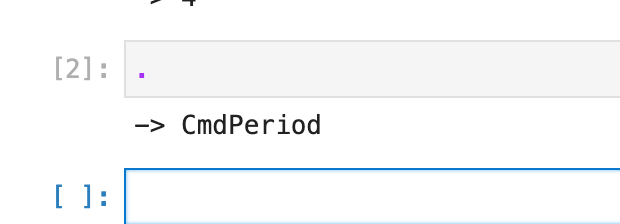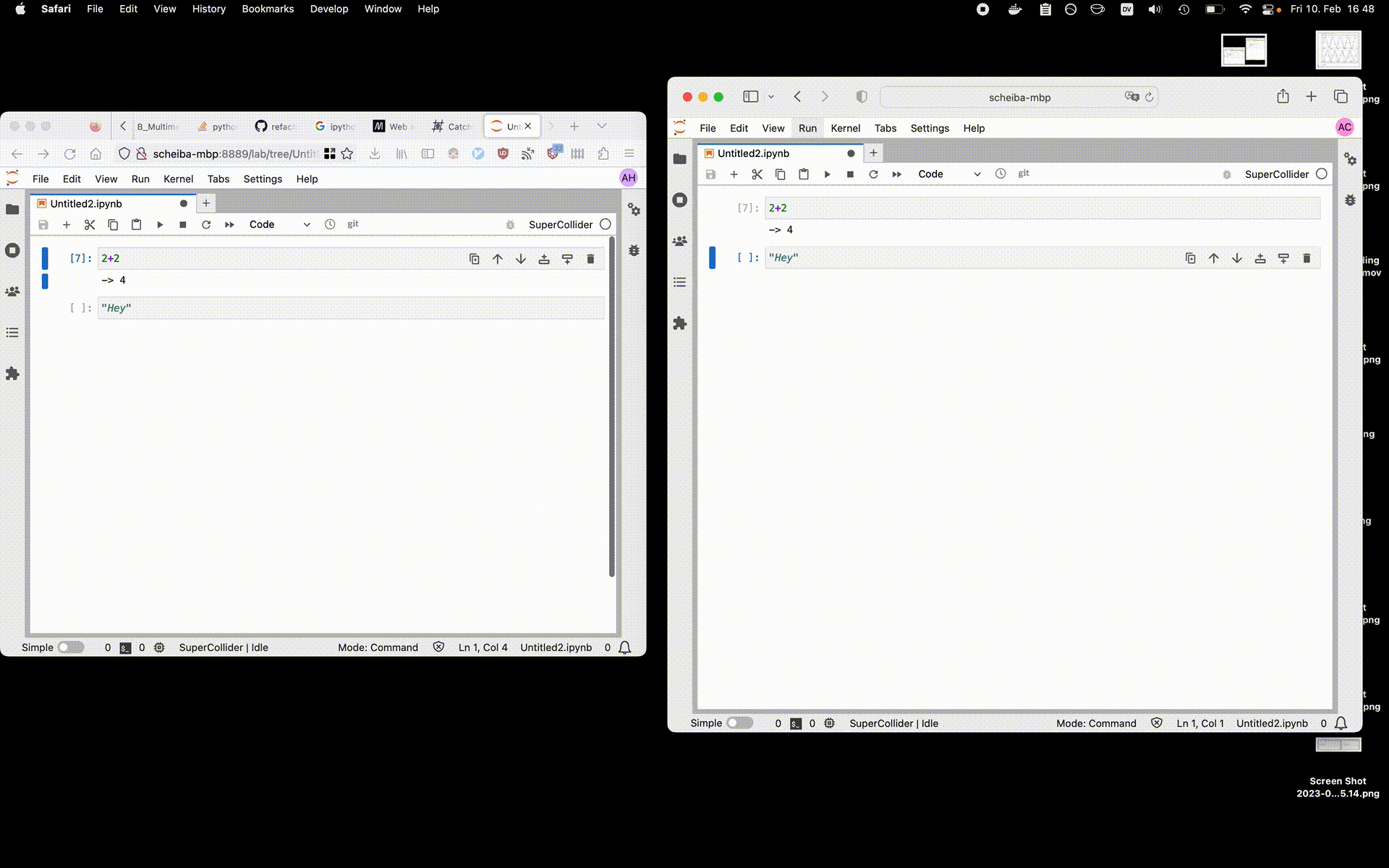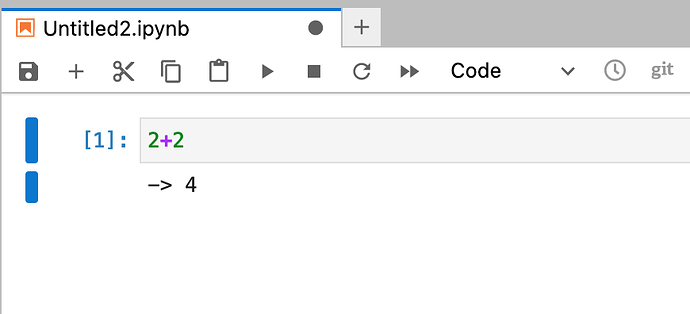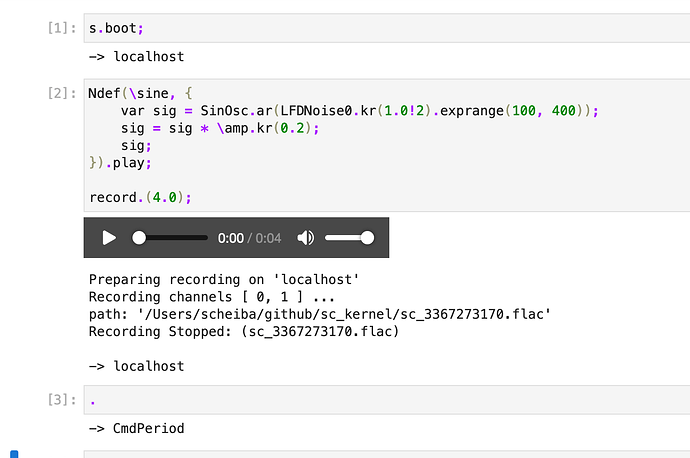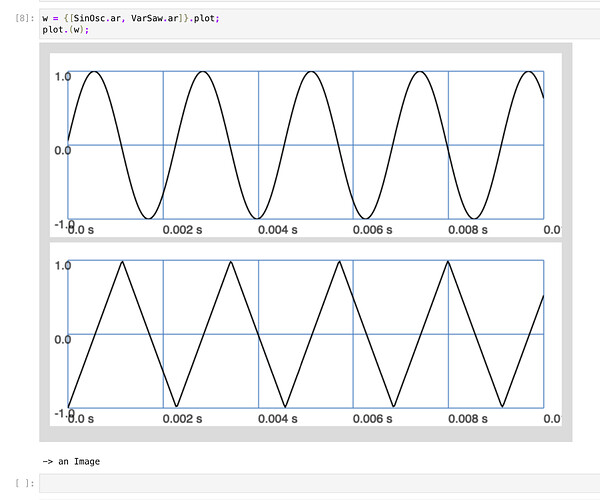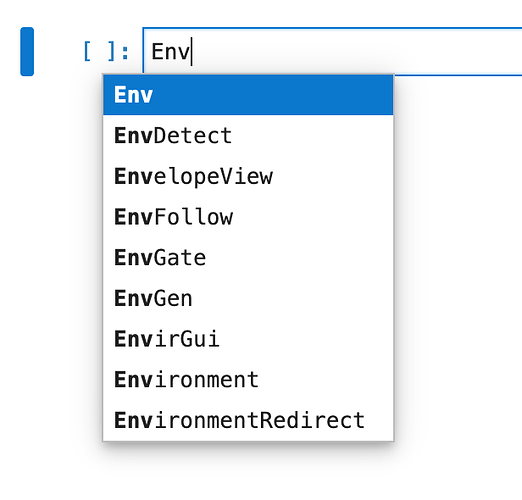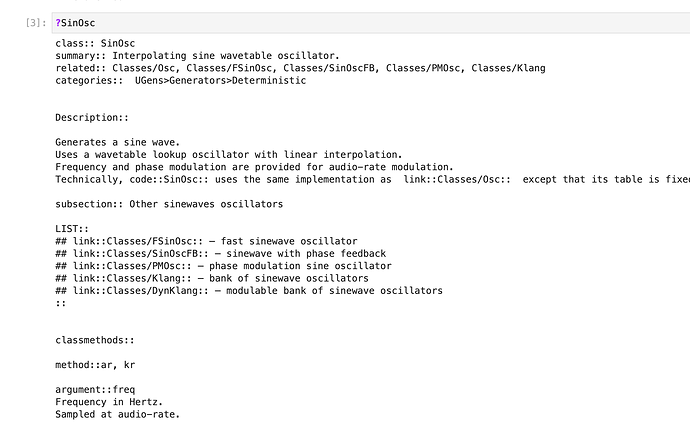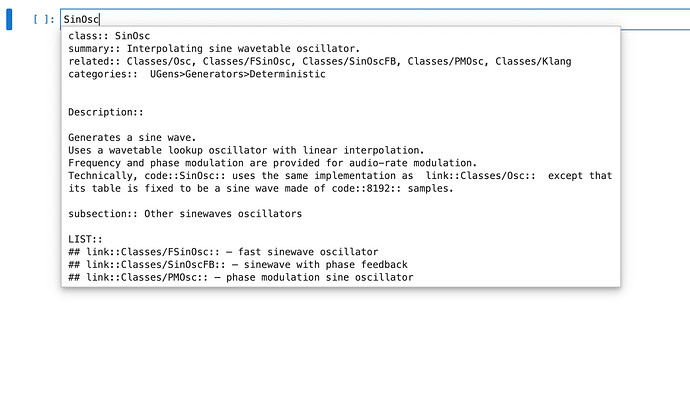Hi there!
Thanks for this great tool!
I have not tried to use this because my machine is (m1max).
Now I am investing my time to use it because some months have passed.
I have two questions:
1. {SinOsc.ar}.plot; plot(w) does not work. Is this incompatible with m1max Mac?
2. Is it not possible to use a long path?
It works fine if sclang is located in /Applications/SuperCollider.app/Contents/MacOS/.
However, my sclang is located in “/Users/prko/Dropbox/prko/__myDocs/Writings/Making Sound using Open Sources/mixed/dev - Bleeding edge/SuperCollider.app/Contents/MacOS/”.
I have changed the path in line 149 of the file ~/anaconda3/lib/python3.10/site-packages/sc_kernel/kernel.py.
This works, but I get an error:
File "/Users/prko/anaconda3/lib/python3.10/site-packages/pexpect/pty_spawn.py", line 276, in _spawn
raise ExceptionPexpect('The command was not found or was not ' +
pexpect.exceptions.ExceptionPexpect: The command was not found or was not executable: /Users/prko/Dropbox/prko/__myDocs/Writings/Making.
Is it possible to make the long path name work?
I am attaching whole errors:
Last login: Tue Nov 14 23:31:26 on ttys000
/Users/prko/anaconda3/bin/jupyter_mac.command ; exit;
(base) prko@prkoMBP2021 ~ % /Users/prko/anaconda3/bin/jupyter_mac.command ; exit;
_ _ _ _
| | | |_ __ __| |__ _| |_ ___
| |_| | '_ \/ _` / _` | _/ -_)
\___/| .__/\__,_\__,_|\__\___|
|_|
Read the migration plan to Notebook 7 to learn about the new features and the actions to take if you are using extensions.
https://jupyter-notebook.readthedocs.io/en/latest/migrate_to_notebook7.html
Please note that updating to Notebook 7 might break some of your extensions.
[W 23:44:00.511 NotebookApp] Loading JupyterLab as a classic notebook (v6) extension.
[C 23:44:00.511 NotebookApp] You must use Jupyter Server v1 to load JupyterLab as notebook extension. You have v2.10.0 installed.
You can fix this by executing:
pip install -U "jupyter-server<2.0.0"
[I 23:44:01.154 NotebookApp] Serving notebooks from local directory: /Users/prko
[I 23:44:01.154 NotebookApp] Jupyter Notebook 6.5.4 is running at:
[I 23:44:01.154 NotebookApp] http://localhost:8888/?token=11b6078c959f71fdb106ad863bca6d9df48efd47e79e5c61
[I 23:44:01.154 NotebookApp] or http://127.0.0.1:8888/?token=11b6078c959f71fdb106ad863bca6d9df48efd47e79e5c61
[I 23:44:01.154 NotebookApp] Use Control-C to stop this server and shut down all kernels (twice to skip confirmation).
[C 23:44:01.157 NotebookApp]
To access the notebook, open this file in a browser:
file:///Users/prko/Library/Jupyter/runtime/nbserver-93284-open.html
Or copy and paste one of these URLs:
http://localhost:8888/?token=11b6078c959f71fdb106ad863bca6d9df48efd47e79e5c61
or http://127.0.0.1:8888/?token=11b6078c959f71fdb106ad863bca6d9df48efd47e79e5c61
[I 23:44:08.927 NotebookApp] Creating new notebook in
[I 23:44:09.979 NotebookApp] Kernel started: 5b044056-6d4b-454d-bc3e-3af4d3923203, name: sc_kernel
Traceback (most recent call last):
File "/Users/prko/anaconda3/lib/python3.10/runpy.py", line 196, in _run_module_as_main
return _run_code(code, main_globals, None,
File "/Users/prko/anaconda3/lib/python3.10/runpy.py", line 86, in _run_code
exec(code, run_globals)
File "/Users/prko/anaconda3/lib/python3.10/site-packages/sc_kernel/__main__.py", line 5, in <module>
IPKernelApp.launch_instance(kernel_class=SCKernel)
File "/Users/prko/anaconda3/lib/python3.10/site-packages/traitlets/config/application.py", line 991, in launch_instance
app.initialize(argv)
File "/Users/prko/anaconda3/lib/python3.10/site-packages/traitlets/config/application.py", line 113, in inner
return method(app, *args, **kwargs)
File "/Users/prko/anaconda3/lib/python3.10/site-packages/ipykernel/kernelapp.py", line 704, in initialize
self.init_kernel()
File "/Users/prko/anaconda3/lib/python3.10/site-packages/ipykernel/kernelapp.py", line 552, in init_kernel
kernel = kernel_factory(
File "/Users/prko/anaconda3/lib/python3.10/site-packages/traitlets/config/configurable.py", line 552, in instance
inst = cls(*args, **kwargs)
File "/Users/prko/anaconda3/lib/python3.10/site-packages/sc_kernel/kernel.py", line 139, in __init__
self.wrapper = self._sclang
File "/Users/prko/anaconda3/lib/python3.10/site-packages/sc_kernel/kernel.py", line 158, in _sclang
self.__sclang = ScREPLWrapper(f"{self._sclang_path} -i jupyter")
File "/Users/prko/anaconda3/lib/python3.10/site-packages/sc_kernel/kernel.py", line 239, in __init__
cmd = pexpect.spawn(cmd_or_spawn, encoding="utf-8")
File "/Users/prko/anaconda3/lib/python3.10/site-packages/pexpect/pty_spawn.py", line 205, in __init__
self._spawn(command, args, preexec_fn, dimensions)
File "/Users/prko/anaconda3/lib/python3.10/site-packages/pexpect/pty_spawn.py", line 276, in _spawn
raise ExceptionPexpect('The command was not found or was not ' +
pexpect.exceptions.ExceptionPexpect: The command was not found or was not executable: /Users/prko/Dropbox/prko/__myDocs/Writings/Making.
[I 23:44:12.966 NotebookApp] KernelRestarter: restarting kernel (1/5), new random ports
Traceback (most recent call last):
File "/Users/prko/anaconda3/lib/python3.10/runpy.py", line 196, in _run_module_as_main
return _run_code(code, main_globals, None,
File "/Users/prko/anaconda3/lib/python3.10/runpy.py", line 86, in _run_code
exec(code, run_globals)
File "/Users/prko/anaconda3/lib/python3.10/site-packages/sc_kernel/__main__.py", line 5, in <module>
IPKernelApp.launch_instance(kernel_class=SCKernel)
File "/Users/prko/anaconda3/lib/python3.10/site-packages/traitlets/config/application.py", line 991, in launch_instance
app.initialize(argv)
File "/Users/prko/anaconda3/lib/python3.10/site-packages/traitlets/config/application.py", line 113, in inner
return method(app, *args, **kwargs)
File "/Users/prko/anaconda3/lib/python3.10/site-packages/ipykernel/kernelapp.py", line 704, in initialize
self.init_kernel()
File "/Users/prko/anaconda3/lib/python3.10/site-packages/ipykernel/kernelapp.py", line 552, in init_kernel
kernel = kernel_factory(
File "/Users/prko/anaconda3/lib/python3.10/site-packages/traitlets/config/configurable.py", line 552, in instance
inst = cls(*args, **kwargs)
File "/Users/prko/anaconda3/lib/python3.10/site-packages/sc_kernel/kernel.py", line 139, in __init__
self.wrapper = self._sclang
File "/Users/prko/anaconda3/lib/python3.10/site-packages/sc_kernel/kernel.py", line 158, in _sclang
self.__sclang = ScREPLWrapper(f"{self._sclang_path} -i jupyter")
File "/Users/prko/anaconda3/lib/python3.10/site-packages/sc_kernel/kernel.py", line 239, in __init__
cmd = pexpect.spawn(cmd_or_spawn, encoding="utf-8")
File "/Users/prko/anaconda3/lib/python3.10/site-packages/pexpect/pty_spawn.py", line 205, in __init__
self._spawn(command, args, preexec_fn, dimensions)
File "/Users/prko/anaconda3/lib/python3.10/site-packages/pexpect/pty_spawn.py", line 276, in _spawn
raise ExceptionPexpect('The command was not found or was not ' +
pexpect.exceptions.ExceptionPexpect: The command was not found or was not executable: /Users/prko/Dropbox/prko/__myDocs/Writings/Making.
[I 23:44:16.016 NotebookApp] KernelRestarter: restarting kernel (2/5), new random ports
Traceback (most recent call last):
File "/Users/prko/anaconda3/lib/python3.10/runpy.py", line 196, in _run_module_as_main
return _run_code(code, main_globals, None,
File "/Users/prko/anaconda3/lib/python3.10/runpy.py", line 86, in _run_code
exec(code, run_globals)
File "/Users/prko/anaconda3/lib/python3.10/site-packages/sc_kernel/__main__.py", line 5, in <module>
IPKernelApp.launch_instance(kernel_class=SCKernel)
File "/Users/prko/anaconda3/lib/python3.10/site-packages/traitlets/config/application.py", line 991, in launch_instance
app.initialize(argv)
File "/Users/prko/anaconda3/lib/python3.10/site-packages/traitlets/config/application.py", line 113, in inner
return method(app, *args, **kwargs)
File "/Users/prko/anaconda3/lib/python3.10/site-packages/ipykernel/kernelapp.py", line 704, in initialize
self.init_kernel()
File "/Users/prko/anaconda3/lib/python3.10/site-packages/ipykernel/kernelapp.py", line 552, in init_kernel
kernel = kernel_factory(
File "/Users/prko/anaconda3/lib/python3.10/site-packages/traitlets/config/configurable.py", line 552, in instance
inst = cls(*args, **kwargs)
File "/Users/prko/anaconda3/lib/python3.10/site-packages/sc_kernel/kernel.py", line 139, in __init__
self.wrapper = self._sclang
File "/Users/prko/anaconda3/lib/python3.10/site-packages/sc_kernel/kernel.py", line 158, in _sclang
self.__sclang = ScREPLWrapper(f"{self._sclang_path} -i jupyter")
File "/Users/prko/anaconda3/lib/python3.10/site-packages/sc_kernel/kernel.py", line 239, in __init__
cmd = pexpect.spawn(cmd_or_spawn, encoding="utf-8")
File "/Users/prko/anaconda3/lib/python3.10/site-packages/pexpect/pty_spawn.py", line 205, in __init__
self._spawn(command, args, preexec_fn, dimensions)
File "/Users/prko/anaconda3/lib/python3.10/site-packages/pexpect/pty_spawn.py", line 276, in _spawn
raise ExceptionPexpect('The command was not found or was not ' +
pexpect.exceptions.ExceptionPexpect: The command was not found or was not executable: /Users/prko/Dropbox/prko/__myDocs/Writings/Making.
[I 23:44:19.082 NotebookApp] KernelRestarter: restarting kernel (3/5), new random ports
Traceback (most recent call last):
File "/Users/prko/anaconda3/lib/python3.10/runpy.py", line 196, in _run_module_as_main
return _run_code(code, main_globals, None,
File "/Users/prko/anaconda3/lib/python3.10/runpy.py", line 86, in _run_code
exec(code, run_globals)
File "/Users/prko/anaconda3/lib/python3.10/site-packages/sc_kernel/__main__.py", line 5, in <module>
IPKernelApp.launch_instance(kernel_class=SCKernel)
File "/Users/prko/anaconda3/lib/python3.10/site-packages/traitlets/config/application.py", line 991, in launch_instance
app.initialize(argv)
File "/Users/prko/anaconda3/lib/python3.10/site-packages/traitlets/config/application.py", line 113, in inner
return method(app, *args, **kwargs)
File "/Users/prko/anaconda3/lib/python3.10/site-packages/ipykernel/kernelapp.py", line 704, in initialize
self.init_kernel()
File "/Users/prko/anaconda3/lib/python3.10/site-packages/ipykernel/kernelapp.py", line 552, in init_kernel
kernel = kernel_factory(
File "/Users/prko/anaconda3/lib/python3.10/site-packages/traitlets/config/configurable.py", line 552, in instance
inst = cls(*args, **kwargs)
File "/Users/prko/anaconda3/lib/python3.10/site-packages/sc_kernel/kernel.py", line 139, in __init__
self.wrapper = self._sclang
File "/Users/prko/anaconda3/lib/python3.10/site-packages/sc_kernel/kernel.py", line 158, in _sclang
self.__sclang = ScREPLWrapper(f"{self._sclang_path} -i jupyter")
File "/Users/prko/anaconda3/lib/python3.10/site-packages/sc_kernel/kernel.py", line 239, in __init__
cmd = pexpect.spawn(cmd_or_spawn, encoding="utf-8")
File "/Users/prko/anaconda3/lib/python3.10/site-packages/pexpect/pty_spawn.py", line 205, in __init__
self._spawn(command, args, preexec_fn, dimensions)
File "/Users/prko/anaconda3/lib/python3.10/site-packages/pexpect/pty_spawn.py", line 276, in _spawn
raise ExceptionPexpect('The command was not found or was not ' +
pexpect.exceptions.ExceptionPexpect: The command was not found or was not executable: /Users/prko/Dropbox/prko/__myDocs/Writings/Making.
[I 23:44:22.143 NotebookApp] KernelRestarter: restarting kernel (4/5), new random ports
Traceback (most recent call last):
File "/Users/prko/anaconda3/lib/python3.10/runpy.py", line 196, in _run_module_as_main
return _run_code(code, main_globals, None,
File "/Users/prko/anaconda3/lib/python3.10/runpy.py", line 86, in _run_code
exec(code, run_globals)
File "/Users/prko/anaconda3/lib/python3.10/site-packages/sc_kernel/__main__.py", line 5, in <module>
IPKernelApp.launch_instance(kernel_class=SCKernel)
File "/Users/prko/anaconda3/lib/python3.10/site-packages/traitlets/config/application.py", line 991, in launch_instance
app.initialize(argv)
File "/Users/prko/anaconda3/lib/python3.10/site-packages/traitlets/config/application.py", line 113, in inner
return method(app, *args, **kwargs)
File "/Users/prko/anaconda3/lib/python3.10/site-packages/ipykernel/kernelapp.py", line 704, in initialize
self.init_kernel()
File "/Users/prko/anaconda3/lib/python3.10/site-packages/ipykernel/kernelapp.py", line 552, in init_kernel
kernel = kernel_factory(
File "/Users/prko/anaconda3/lib/python3.10/site-packages/traitlets/config/configurable.py", line 552, in instance
inst = cls(*args, **kwargs)
File "/Users/prko/anaconda3/lib/python3.10/site-packages/sc_kernel/kernel.py", line 139, in __init__
self.wrapper = self._sclang
File "/Users/prko/anaconda3/lib/python3.10/site-packages/sc_kernel/kernel.py", line 158, in _sclang
self.__sclang = ScREPLWrapper(f"{self._sclang_path} -i jupyter")
File "/Users/prko/anaconda3/lib/python3.10/site-packages/sc_kernel/kernel.py", line 239, in __init__
cmd = pexpect.spawn(cmd_or_spawn, encoding="utf-8")
File "/Users/prko/anaconda3/lib/python3.10/site-packages/pexpect/pty_spawn.py", line 205, in __init__
self._spawn(command, args, preexec_fn, dimensions)
File "/Users/prko/anaconda3/lib/python3.10/site-packages/pexpect/pty_spawn.py", line 276, in _spawn
raise ExceptionPexpect('The command was not found or was not ' +
pexpect.exceptions.ExceptionPexpect: The command was not found or was not executable: /Users/prko/Dropbox/prko/__myDocs/Writings/Making.
[I 23:44:25.201 NotebookApp] KernelRestarter: restarting kernel (5/5), new random ports
Traceback (most recent call last):
File "/Users/prko/anaconda3/lib/python3.10/runpy.py", line 196, in _run_module_as_main
return _run_code(code, main_globals, None,
File "/Users/prko/anaconda3/lib/python3.10/runpy.py", line 86, in _run_code
exec(code, run_globals)
File "/Users/prko/anaconda3/lib/python3.10/site-packages/sc_kernel/__main__.py", line 5, in <module>
IPKernelApp.launch_instance(kernel_class=SCKernel)
File "/Users/prko/anaconda3/lib/python3.10/site-packages/traitlets/config/application.py", line 991, in launch_instance
app.initialize(argv)
File "/Users/prko/anaconda3/lib/python3.10/site-packages/traitlets/config/application.py", line 113, in inner
return method(app, *args, **kwargs)
File "/Users/prko/anaconda3/lib/python3.10/site-packages/ipykernel/kernelapp.py", line 704, in initialize
self.init_kernel()
File "/Users/prko/anaconda3/lib/python3.10/site-packages/ipykernel/kernelapp.py", line 552, in init_kernel
kernel = kernel_factory(
File "/Users/prko/anaconda3/lib/python3.10/site-packages/traitlets/config/configurable.py", line 552, in instance
inst = cls(*args, **kwargs)
File "/Users/prko/anaconda3/lib/python3.10/site-packages/sc_kernel/kernel.py", line 139, in __init__
self.wrapper = self._sclang
File "/Users/prko/anaconda3/lib/python3.10/site-packages/sc_kernel/kernel.py", line 158, in _sclang
self.__sclang = ScREPLWrapper(f"{self._sclang_path} -i jupyter")
File "/Users/prko/anaconda3/lib/python3.10/site-packages/sc_kernel/kernel.py", line 239, in __init__
cmd = pexpect.spawn(cmd_or_spawn, encoding="utf-8")
File "/Users/prko/anaconda3/lib/python3.10/site-packages/pexpect/pty_spawn.py", line 205, in __init__
self._spawn(command, args, preexec_fn, dimensions)
File "/Users/prko/anaconda3/lib/python3.10/site-packages/pexpect/pty_spawn.py", line 276, in _spawn
raise ExceptionPexpect('The command was not found or was not ' +
pexpect.exceptions.ExceptionPexpect: The command was not found or was not executable: /Users/prko/Dropbox/prko/__myDocs/Writings/Making.
[W 23:44:28.260 NotebookApp] KernelRestarter: restart failed
[W 23:44:28.262 NotebookApp] Kernel 5b044056-6d4b-454d-bc3e-3af4d3923203 died, removing from map.
[W 23:45:10.000 NotebookApp] Timeout waiting for kernel_info reply from 5b044056-6d4b-454d-bc3e-3af4d3923203
[E 23:45:10.011 NotebookApp] Error opening stream: HTTP 404: Not Found (Kernel does not exist: 5b044056-6d4b-454d-bc3e-3af4d3923203)
[W 23:45:11.039 NotebookApp] 404 GET /api/kernels/5b044056-6d4b-454d-bc3e-3af4d3923203/channels?session_id=708c5e95110949dd8248fd9246f75b22 (::1): Kernel does not exist: 5b044056-6d4b-454d-bc3e-3af4d3923203
[W 23:45:11.059 NotebookApp] 404 GET /api/kernels/5b044056-6d4b-454d-bc3e-3af4d3923203/channels?session_id=708c5e95110949dd8248fd9246f75b22 (::1) 30.890000ms referer=None
[W 23:45:13.104 NotebookApp] 404 GET /api/kernels/5b044056-6d4b-454d-bc3e-3af4d3923203/channels?session_id=708c5e95110949dd8248fd9246f75b22 (::1): Kernel does not exist: 5b044056-6d4b-454d-bc3e-3af4d3923203
[W 23:45:13.108 NotebookApp] 404 GET /api/kernels/5b044056-6d4b-454d-bc3e-3af4d3923203/channels?session_id=708c5e95110949dd8248fd9246f75b22 (::1) 8.770000ms referer=None
[W 23:45:17.206 NotebookApp] 404 GET /api/kernels/5b044056-6d4b-454d-bc3e-3af4d3923203/channels?session_id=708c5e95110949dd8248fd9246f75b22 (::1): Kernel does not exist: 5b044056-6d4b-454d-bc3e-3af4d3923203
[W 23:45:17.207 NotebookApp] 404 GET /api/kernels/5b044056-6d4b-454d-bc3e-3af4d3923203/channels?session_id=708c5e95110949dd8248fd9246f75b22 (::1) 5.070000ms referer=None
[W 23:45:25.310 NotebookApp] 404 GET /api/kernels/5b044056-6d4b-454d-bc3e-3af4d3923203/channels?session_id=708c5e95110949dd8248fd9246f75b22 (::1): Kernel does not exist: 5b044056-6d4b-454d-bc3e-3af4d3923203
[W 23:45:25.311 NotebookApp] 404 GET /api/kernels/5b044056-6d4b-454d-bc3e-3af4d3923203/channels?session_id=708c5e95110949dd8248fd9246f75b22 (::1) 5.030000ms referer=None
![]()

![]()
